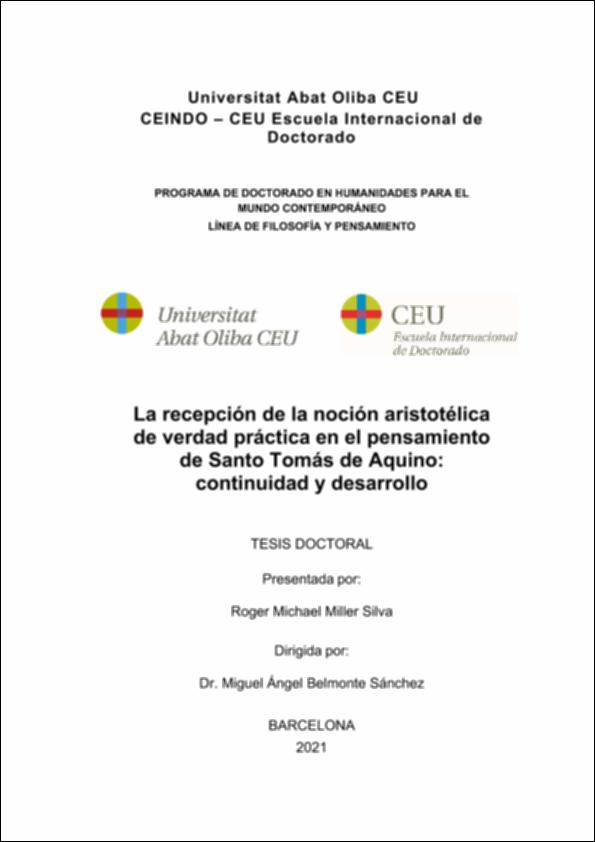Por favor, use este identificador para citar o enlazar este ítem:
http://hdl.handle.net/10637/14474La recepción de la noción aristotélica de verdad práctica en el pensamiento de Santo Tomás de Aquino : continuidad y desarrollo
| Título : | La recepción de la noción aristotélica de verdad práctica en el pensamiento de Santo Tomás de Aquino : continuidad y desarrollo |
| Autor : | Miller Silva, Roger Michael |
| Materias: | Tomás de Aquino, Santo.; Verdad.; Ética.; Filosofía de la historia.; Prudencia.; Practical understanding; Practical truth.; Prudence. |
| Resumen : | La noción de verdad práctica (ἀλήθεια πρακτική), una de las más interesantes de la ética aristotélica, ha sido redescubierta en las últimas décadas, sobre todo a partir del movimiento de rehabilitación de la filosofía práctica en Alemania y de la renovación del interés por el razonamiento práctico en los autores de lengua inglesa. Paralelamente, ha crecido la preocupación por entender cómo dicha noción aparece en las obras de Santo Tomás de Aquino —no solo en su Comentario a la Ética de Aristóteles sino también en todo el Corpus Thomisticum— y cómo se integra en su síntesis filosófica, donde concurren otros aportes del pensamiento medieval. Esta clase especial de verdad, propia del entendimiento práctico, trasciende en cierto modo la definición usual de adaequatio rei et intellectus, puesto que tanto el Estagirita como el Aquinate la conciben como una suerte de adecuación del intelecto y del deseo con vistas a una buena acción. Santo Tomás, al recoger la noción de verdad práctica propuesta en la Ética a Nicómaco, no solo la concibe formalmente como conformitas ad appetitum rectum, sino que además ubica dicha conformidad en el actuar de la prudencia, en cuanto hábito intelectual estrechamente vinculado a la virtud moral, donde confluyen lo verdadero y lo bueno. El objetivo de esta tesis es analizar la recepción de la noción aristotélica de verdad práctica en el pensamiento de Santo Tomás, destacando en esa recepción dos aspectos principales: el primero es el de la continuidad entre los dos autores con respecto a la comprensión que tienen de la verdad práctica, en el sentido de que se preservan los elementos esenciales que caracterizan esta clase peculiar de verdad; y el segundo, el de un desarrollo importante de esa noción en el pensamiento del Aquinate, quien no solo aclara los elementos obscuros o incipientes de la exposición del Estagirita, sino que introduce en su reflexión los aportes de la filosofía medieval y asimismo de la teología moral. The notion of practical truth (ἀλήθεια πρακτική), one of the most interesting in Aristotelian ethics, has been rediscovered in recent decades, especially following the movement for the rehabilitation of practical philosophy in Germany and the renewal of interest in practical reasoning in English-language authors. At the same time, concern has grown to understand how this notion appears in the works of Saint Thomas Aquinas —not only in his Commentary on Aristotle's Ethics but also in the entire Corpus Thomisticum— and how it is integrated into his philosophical synthesis, where other contributions of medieval thought concur. This special kind of truth, proper to practical understanding, transcends in a certain way the usual definition of ‘adaequatio rei et intellectus’, since both the Stagirite and Aquinas conceive of it as a kind of adequacy of the intellect and desire with a view to a good action. Saint Thomas, when collecting the notion of practical truth proposed in the Nicomachean Ethics, not only formally conceives it as ‘conformitas ad appetitum rectum’, but also situates this conformity in the act of prudence, as an intellectual virtue closely linked to moral excellence, where the true and the good converge. The objective of this doctoral thesis is to analyse the reception of the Aristotelian notion of practical truth in the thought of Saint Thomas Aquinas, highlighting in this reception two main aspects: the first, that of the continuity between the two authors in terms of understanding that they have practical truth, in the sense that the essential elements that characterise this peculiar kind of truth are preserved; and the second, that of a significant development of this notion in Aquinas’ thought, which not only clarifies the obscure or incipient elements of the Stagirite’s exposition, but also introduces in his reflection the contributions of medieval philosophy and moral theology as well. |
| Descripción : | Tesis CEINDO, Universitat Abat Oliba CEU, Programa de doctorado "Humanidades para el Mundo Contemporáneo". Leída el 29 de septiembre de2021 |
| Director(es): | Belmonte Sánchez, Miguel Ángel |
| Fecha de defensa: | 29-09 -2021 |
| URI : | http://hdl.handle.net/10637/14474 |
| Derechos: | http://creativecommons.org/licenses/by-nc-nd/4.0/deed.es |
| Fecha de publicación : | 27-jun-2023 |
| Centro : | Universitat Abat Oliba CEU |
| Aparece en las colecciones: | Humanidades para el Mundo Contemporáneo |
Los ítems de DSpace están protegidos por copyright, con todos los derechos reservados, a menos que se indique lo contrario.


